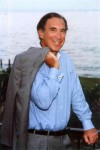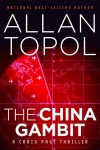The China Gambit by Allan Topol
The legal profession seems to attract a disproportionate number of attorneys who would willingly give up their law practices for successful careers as authors. Allan J. Topol, on the other hand, put a promising career as a writer on the back burner so he could devote his full attention to family and to a burgeoning practice in environmental law.
Topol published a couple of thrillers to good reviews, FOURTH OF JULY WAR (in 1978) and WOMAN OF VALOR (in 1981), then he took a break, a long one. For writers struggling to get published, calling a time out on a promising career would seem an unthinkable risk. For Topol, it was a good decision.
“I always wanted to be a writer,” Topol recalled. Sports editor of the high school paper, Topol was a chemistry major at the Carnegie Institute of Technology, where he convinced a professor in the English Department to help with his writing. After graduating from Yale Law School, he joined a firm in Washington DC and started turning out short stories. He tried—unsuccessfully—to sell the stories in the early 1970s.
“It was hard to get them published,” he said. “Then I got some advice to try writing a novel. This was around the time of the gas crisis, long lines at service stations, oil embargos, and I wondered, ‘how could the government let this happen?’ FOURTH OF JULY WAR, my first novel, was an attempt to answer that question.
“I was writing in my spare time, on planes, on vacation, but I never stopped being a lawyer, always with the same firm (Covington & Burling LLP, where he still serves as Senior Counsel).”
Topol’s law practice “took off” around the time his second novel came out. Superfund legislation was passed by Congress in the 1970s to address cleanup of high-profile hazardous waste sites like Love Canal and Times Beach and Topol parlayed his technical background and legal training into a career as a prominent environmental law specialist. A demanding law practice and a growing family left little time for writing.
“I missed the writing,” Topol said, “but I knew that I would be able to come back to it later. The break actually was good for me. I met a lot of interesting people, did a lot of things, and now I can draw on those experiences. I gained some maturity and I’m a better writer now.” He also traveled extensively, often to locales that keep turning up in his books.
“Foreign places are important to the books,” the author said. “I use international issues as background and as flashpoints for the novels, oil and energy, nuclear weapons in the Middle East, corruption in Washington, espionage, conspiracies, the CIA.” Topol has visited most of the places he writes about, and he does extensive research into those he hasn’t seen in person. “You’ve got to be accurate,” he explained, “because it affects your credibility. That’s important, even in fiction. Readers notice and it grates on them when you get something wrong.”
Topol started writing again when his legal workload dropped and “when the last child went off to college,” taking up where he left off with a new batch of international thrillers. A succession of novels followed—SPY DANCE, DARK AMBITION, CONSPIRACY, ENEMY OF MY ENEMY—and along the way he became one of the founding members of International Thriller Writers.
His most recent book, THE CHINA GAMBIT, due out this month from Vantage Point, is the first installment in a series featuring retired CIA agent Craig Page. THE CHINA GAMBIT and the next two books in the series, THE SPANIGH REVENGE (due for release in September 2102) and THE RUSSIAN ENDEAVOR (April 2013), mark a departure for Topol, whose previous novels were stand-alone thrillers.
In THE CHINA GAME, Page must track down the killer of his daughter, a reporter who dies while investigating a controversial story in Canada. Working with his daughter’s editor, Elizabeth Crowder, Page uncovers a conspiracy between the Chinese and the director of the CIA to wreck the US economy and allow China to become the dominant world power. The action moves from Canada, to Iran, to Beijing, to Washington, to Aspen as Page and Crowder race to avert a global catastrophe.
“It was a mistake not having a ‘franchise’ character,” Topol explained of his decision to keep Page in action through several books. “I realized that I needed to make a change to get to the top. I wanted to keep the same protagonist, the same love interest, and the same villain across the series. It’s more interesting for a writer to deal with the way characters react to situations based on their past. I felt more involved with the characters as I worked on the first three books in the series, and I can understand how readers become attached to them, too.”
Writing a series can be a difficult balancing act, though, Topol added.
“You need to provide enough background information for people who haven’t read the earlier books, but not so much detail that people start to skim.”
Topol said that establishing personal relationships was one of the most rewarding parts of his law practice. He hopes that the “Craig Page thrillers” will forge similar relationships with his readers.
*****
 Allan Topol is the national bestselling author of six novels of international intrigue. He is a graduate of Carnegie Institute of Technology, who majored in chemistry, abandoned science, and obtained a law degree from Yale University. A partner in a major Washington law firm and an avid wine collector, he has traveled extensively, researching dramatic locations for his novels. You can visit him on his website for information about upcoming Craig Page thrillers.
Allan Topol is the national bestselling author of six novels of international intrigue. He is a graduate of Carnegie Institute of Technology, who majored in chemistry, abandoned science, and obtained a law degree from Yale University. A partner in a major Washington law firm and an avid wine collector, he has traveled extensively, researching dramatic locations for his novels. You can visit him on his website for information about upcoming Craig Page thrillers.
- Murder by Moonlight by Vincent Zandri - December 31, 2012
- The Dynamics of Murder: Kill or Be Killed by R. Barri Flowers - December 1, 2012
- The Other Woman by Hank Phillippi Ryan - September 30, 2012

